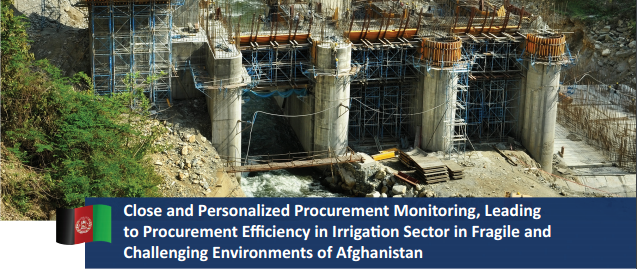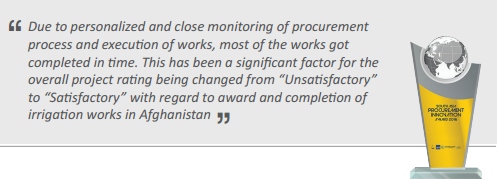Feature Stories
- How Bangladesh bridged the gap between amateur and professional in government procurement
- Rated Criteria: Promoting Value in World Bank Procurement
- Public Procurement Transformation in Bangladesh
- Achievement of Value for Money and Enhancement of Efficiency, Economy and Transparency in Procurement - Document Archive System
Archives
- End-to-End Procurement Planning and Maintenance System Integrated with Project MIS
- Application of Construction Milestones in Rural Road Contracts of Nepal
- Gross National Happiness Model for Pursuing Sustainable Public Procurement
- Government procurement is the basis of wide opportunities for enterprise development
- The Challenges of Procurement Training in a Fragile Country: the Afghanistan Experience
- When and How to Open Contracts: Transparency and Engagement through World Bank Projects
- Innovations and Best Practices in Procurement Processes of Disaster Recovery Projects
- World Bank Experts Discuss Global Procurement Trends and Armenia's e-GP system with the National Assembly
- Technology driving transparent and accountable public procurement reform in Bangladesh
- Prototype for Implementation of Framework Agreement via Blockchain
- Construction Project Planning and Management Capacity Building in India: A Wholistic Approach to Boost Infrastructure Development
- Zimbabwe: Public Procurement reform to catalyze greater transparency and development
- 15th Procurement, Integrity, Management and Openness (PRIMO) Forum
- e-Procurement World Map
- Preventing and controlling corruption: A modern approach to Procurement
- 6th South Asia Public Procurement Conference held in Thimphu, Bhutan
- South Asia Procurement Innovation Awards 2018 Announced
- Procurement iNET completes 5 years and new CPPP Fastest 100% Challenge Launched
- Risky Business: Does Debarring Poor Performers Mitigate Future Performance Risk?
- Global Procurement Summit 2019, New Delhi, India
- World Bank India launches Survey for International Civil Works Contractors
- World Bank launches new Complaints Module in Systematic Tracking of Exchanges in Procurement (STEP) System
- New Open Contracting Data Standard for e-Procurement Systems Launched
- Bangladesh's success in public procurement: Sustained reform really pays off
- The five drivers for improving public sector performance: Lessons from the new World Bank Global Report
- South Asia Public Procurement Innovation Awards 2018
- Conversation with Khaled Elarbi, President, High Authority for Public Procurement (HAICOP), Tunisia on the Digitalization of Public Procurement
- Breaking the glass ceiling in Africa: Rwanda E-Government Procurement System
- How government e-marketplace is revolutionizing procurement in India
- Ensuring Value for Money in Infrastructure Projects - The Botswana way
- Blockchain Lessons for Procurement
- Botswana’s Benevolent Move to Enhance its Procurement Profession
- Achieving Better Value for Money Using e-Auction for Procurement of Goods by Public Sector - A Success Case from DPDC
- Guide to Project Management and Contract Management (GPMCM) – New Approach to Improve Efficiency and Effectiveness of Procurement Outcomes
- Regional Winners of SAPIA 2017 participate in 8th International Public Procurement Conference (IPPC 8) Arusha, Tanzania
- The Future of Public Procurement in the Era of Digitalization
- World Bank Operations Procurement Helping Turkey to Procure a US$2 Billion Gas Storage Facility
- Unlocking Energy Efficiency Market in India - Through Innovative Procurement Business Model
- Getting value for money: Creating an automated market place for farmers in Pakistan
- Towards a Single Market for Public Procurement in Caribbean Small States
- Web-Based Online Evaluation Tool (e-Tool) for Procurement of Works by Royal Government of Bhutan
- Strengthening Health Sector Procurement System Offer Hopes for Universal Health Coverage in Nepal
- Morocco makes Strides in Modernizing its Public Procurement System— Operationalization of the Procurement Regulatory Body
- Innovations in Procurement Process and Selection that Lead to Improved Outcomes – Tenderers’ Database Management System
- Looking Back and Forward: The World Bank’s Procurement Framework
- Independent Monitoring and Evaluation of Contracted Health Services Leads to Improved Outcomes in Rural Areas of Afghanistan
- Fifth South Asia Region Public Procurement Conference brings focus on Procurement in Public Service Delivery
- 12 Procurement Innovations from South Asian Countries Celebrated
- Social Media is Improving Procurement in Lao PDR
- ASEAN meeting explores ways of professionalizing public procurement to meet development challenges
- Second International Training Program on the World Bank’s New Procurement Framework
- South Asia Procurement Innovations Award 2017 launched with Bigger and Better Prizes
- How to bid, finding opportunities, what makes a successful bid
- Pushing boundaries in procurement framework implementation
- Experience of Developing PPSD for the Assam Agribusiness and Rural Transformation Project (APART), India
- An Electronic Approach: Streamlining Georgia's Procurement
- South Asia Heads of Procurement Knowledge Exchange Program to U.S. Government Procurement Systems started
- 13th Procurement, Integrity, Management and Openness (PRIMO) Forum - a Documentary
- Bangladesh to strengthen public procurement with World Bank supported Project
- Establishment of Technology-Based Health Procurement and Supply Chain Management System, and Capacity Development in Tamil Nadu Medical Services Corporation
- Towards a Single Market for Public Procurement in Caribbean Small States
- Redefining Procurement as an Innovative and Collaborative Centre of Excellence for Best-in-Class Sourcing Solution
- India’s PowerGrid Endorsed for Alternative Procurement Arrangements by the World Bank
- Achieving Value for Money in Indonesia’s Geothermal Project
- Citizen Monitoring of Rural Roads Under Pradhan Mantri Gram Sadak Yojana (PMGSY), India
- Establishment of Grant and Service Contract Management Unit (GCMU) to Manage Contracting Out of Health Services in Afghanistan
- Procurement for Regional Development–Public Policy Initiative in Sri Lanka
- PPAF Community-Driven Development (CDD) Procurement Model, Pakistan
- Making Successful Procurement of IT Systems - An Experience from Vietnam
- Procurement Observatories continue to deliver in India
- Implementation of National e-GP System in Nepal
- Government e-Marketplace (GeM), India
- Africa High Level Public Procurement and Electronic Government Procurement Forums
- Development of Procurement Cadre as Part of Holistic Procurement Reforms in Bhutan
- Modernizing Public Procurement in Zimbabwe, one Step at a Time
- Citizen Engagement During Public Procurement Implementation in Bangladesh
- Winter 2017 Virtual Procurement, Integrity, Management, and Openness (PRIMO) Forum on Sanctions and Debarment Systems
- Close and Personalized Procurement Monitoring, Leading to Procurement Efficiency in Irrigation Sector in Fragile and Challenging Environments of Afghanistan
- Procurement Framework 2016 offers wider choices to ‘Go to Market’ based on PPSD
- Procurement Framework 2016 - Benefits, Status of Roll-out and M&E Arrangements
- PPSD offers Fit for Purpose Procurement Solutions
- Global Procurement Summit
- Fourth South Asia Region Public Procurement Conference
- The World Bank e-Procurement Tools
- South Asia Procurement Innovations Awards, 2016
- Learning Videos launched on STEP, online tracking tool on procurement for World Bank Projects
- Open e-Learning is Building a Cadre of Procurement Experts
- South Asia Region Public Procurement Conference, 2017
- Online Certificate Program in Public Procurement in Arabic Launched in Egypt
- First Procurement Knowledge Exchange Forum among ASEAN Countries
- Nobel Prize in Economics for contribution to Theory of Contract
- The Africa Region Harnesses Integrated e-Government Procurement (e-GP) Systems in Pursuit of Transparency and Integrity
- Procurement Reform for Humanitarian and Development Challenges in Kurdistan Region of Iraq (KRI)
- Successful Procurement is not just a set of Activities, it is a Strategy
- Afghanistan - Trends and Recent Developments in Governance
- PPSD is an Opportunity for clients and staff for Improved Procurement Management
- Procurement Reform Advances in the MENA Region
- Data Analysis and Collaborative Work in Action for Expedited Disbursements in Africa
- Ensuring Good Governance in Procurement in Sri Lanka
- New Procurement System to Improve Development Impact and Transparency in South Asia
- World Bank, USTDA Formalize Procurement Partnership
- How the New Procurement Framework Will Benefit 45.6 Million People in India
- Procuring the Future
- Reasons to Bid, Finding Business Opportunities
- New World Bank Procurement Framework Promotes Strengthened National Procurement Systems
- The readiness for Procurement Framework 2016
- 6 Things to know about New Procurement Framework
Close and Personalized Procurement Monitoring, Leading to Procurement Efficiency in Irrigation Sector in Fragile and Challenging Environments of Afghanistan


{This article is an abridged version of the submission on “Expediting Procurement, Reducing Procurement Time, and Achieving Cost Savings through Innovative Procurement and Contract Management Solutions for Challenging and Fragile Environments” made by Mr. Pervaiz Ahmad Naseri, Project Manager, Ministry of Agriculture, Irrigation, and Livestock, Government of Afghanistan, for the South Asia Procurement Innovation Awards.}
Summary
The On-Farm Water Management (OFWM) Project mainly aims at improving the efficiency of water use to increase agricultural production, building capacity of local staff in implementing similar projects in the country, and educating farmers about the need to improve their agricultural practices and adopt high-efficiency irrigation.
A Kabul-based Project Implementation Unit, headed by the Project Director / Manager, with assistance from a Core Team of Specialists and Support Staff, is responsible for execution of the project. By following a desk-oriented approach of designating one staff responsible for end-to-end management of procurement, using IT for followup, and through regular interactive sessions with contractors, the project team gained considerable efficiencies in process management.
Background
The OFWM Project, funded by Afghanistan Reconstruction Trust Fund (ARTF) under the Ministry of Agriculture, Irrigation, and Livestock, was approved in January 2011. Five regional area teams – one each in Kabul, Nangarhar (Jalalabad), Mazar-i- Sharif (Balkh), Baghlan, and Herat, have been established for implementation of various field activities under the OFWM Project. The Project Implementation Unit found that the following were needed for successful implementation of the OFWM Project:
- Expedite the designing of various irrigation schemes, which have already been surveyed, but preparation / finalization / review / approval of designs is pending at various stages in the five area offices / regions of the project as also at the head office in Kabul.
- Prepare the bidding documents immediately after completion of designs. Advertize all irrigation schemes as soon as drawings and BoQs are made available to the Procurement Unit.
- Expedite selection and survey of new irrigation schemes, so that momentum is maintained to achieve the periodical targets stipulated by World Bank.
- Arrange meetings of Bid Evaluation Committees and prepare / finalize draft Bid Evaluation Reports (BERs) immediately after the meeting.
- Deploy an efficient monitoring system for supervising all procurement activities to expedite technical scrutiny of bids, seek clarifications from bidders, and verify credentials of the recommended bidders. {It is worth mentioning that due to wide-spread submission of fake qualification documents by many bidders in Afghanistan, World Bank has made it mandatory (for all cases) to verify the documents for similar works and liquid assets from the concerned employer and bank respectively.}

The OFWM Project was delayed by about 15 months, resulting in extremely poor utilization of the funds granted. The country’s environment was then fragile and quite challenging, with several problems being faced:
- Though the post-conflict environment in Afghanistan was gradually improving after the prolonged civil wars, infrastructure facilities were very much limited, particularly skills related to the use of high technology.
- Due to frequent terrorist and suicide bombers’ attacks, the overall working environment was very much insecure.
- This was the first On-Farm Water Management Project in Afghanistan. As such, there was limited technical experience of survey and design, procurement of irrigation works, and implementation of such works by the Ministry of Agriculture, Irrigation, and Livestock.
- The Procurement capacity within Afghanistan in general and OFWM Project in particular for proper / timely bidding and evaluation of bids for various goods, works, and consultancy contracts was very much limited.
- Due to a number of development projects going on under different ministries, the turnover of staff was very high and their level of involvement / devotion / initiative was quite low.
- An inappropriate decision for major use of high technology Pre-Cast Parabolic Structures (PCPS) for lining the various irrigation channels had already been taken. The procurement of these PCPS was imposing a major challenge because of inadequate technical capabilities and skills available within Afghanistan for manufacturing them. In addition, unreasonably high prices were being sought by vendors for manufacturing and transporting PCPS.

Following were the innovations made in implementation of the OFWM Project:
- Introduction of a “Desk-Oriented” system of working, making one procurement staff responsible for all procurement activities of a particular procurement package.
- Designing / Developing and introducing standard formats for almost all non-standard procurement documents, such as Procurement Requests, Requests for Quotations, Minutes of Bid Openings, Bid Evaluation Reports, Proposal for Variations / Contract Amendments etc.
- For preparing most of the documents listed above, using Mail/Merge option of MS Word.
- Introducing Procurement Request Registers and other related documentation.
- Improving interaction with vendors by having frequent Vendor’s Workshops and educating them about proper preparation of their bids, and providing proper response to various requests for clarifications and proper execution of contracts.
- Introducing monitoring and follow-up procedures at various stages.
- Proper training and capacity development of the procurement staff.

Impact Generated
Innovative solutions to the problems / issues faced led to the following impacts:
- Due to proper and timely coordination with design units, and monitoring of receipts related to Procurement requests, the average time taken in completing survey and designs was reduced from the earlier 219 days to 59 days.
- Total time taken in awarding NCB works’ contracts was reduced from about 165 days to 76 days {by completing bid evaluation only in average 5 to 13 days (averages of latest 2 periods of year 2016) against earlier average of about 40 to 53 days (averages of earlier 2 periods of the year 2012)}.
- Due to quick evaluation of bids and award of contracts and also improved monitoring of payments, the confidence of bidders / contractors in the project increased day by day. They got encouraged to bid for various other work packages, resulting in healthy competition among bidders / contractors. Thus, in most of the later cases, award of contracts was at prices about 25% lower than the estimated costs. {The award cost of all works awarded in the year 2016 has been about 8.4 Million USD (against the estimated cost of about 11.2 Million USD), leading to saving of about 2.8 Million USD}.
Due to close monitoring of execution of works, most of the works got completed in time. It is worth mentioning that this has been a significant factor in timely award and completion of irrigation works, due to which the overall project rating was changed from “Unsatisfactory” to “Satisfactory”.

Scalability and Sustainability
Though they seem to be simple in a normal environment, these steps have already been replicated within the OFWM Project. The innovation has also positively impacted other processes and projects under the Ministry of Agriculture, Irrigation, and Livestock.
Being related to only general initiatives, common sense, and use of MS Office products (with MS Access), and email facilities, which are available everywhere these days, replication of these innovations can be made within the other organizations of Afghanistan or even in a different country.

The OFWM Project experience shows that following are the prime factors for its success:
- Regular interaction within the Technical and Administration teams, Finance Unit, and World Bank.
- Commitment of the management in monitoring various procurement activities, motivating the procurement staff, and taking interest in solving various procurement and contract management problems and issues.
- Timely updating of data in the database and proper use of various exception reports, and
- Regular training of the staff.
It is also essential that various procurement delays and issues are properly analyzed within time and remedial actions taken in a timely manner. This will help avoid similar delays and issues in future.

